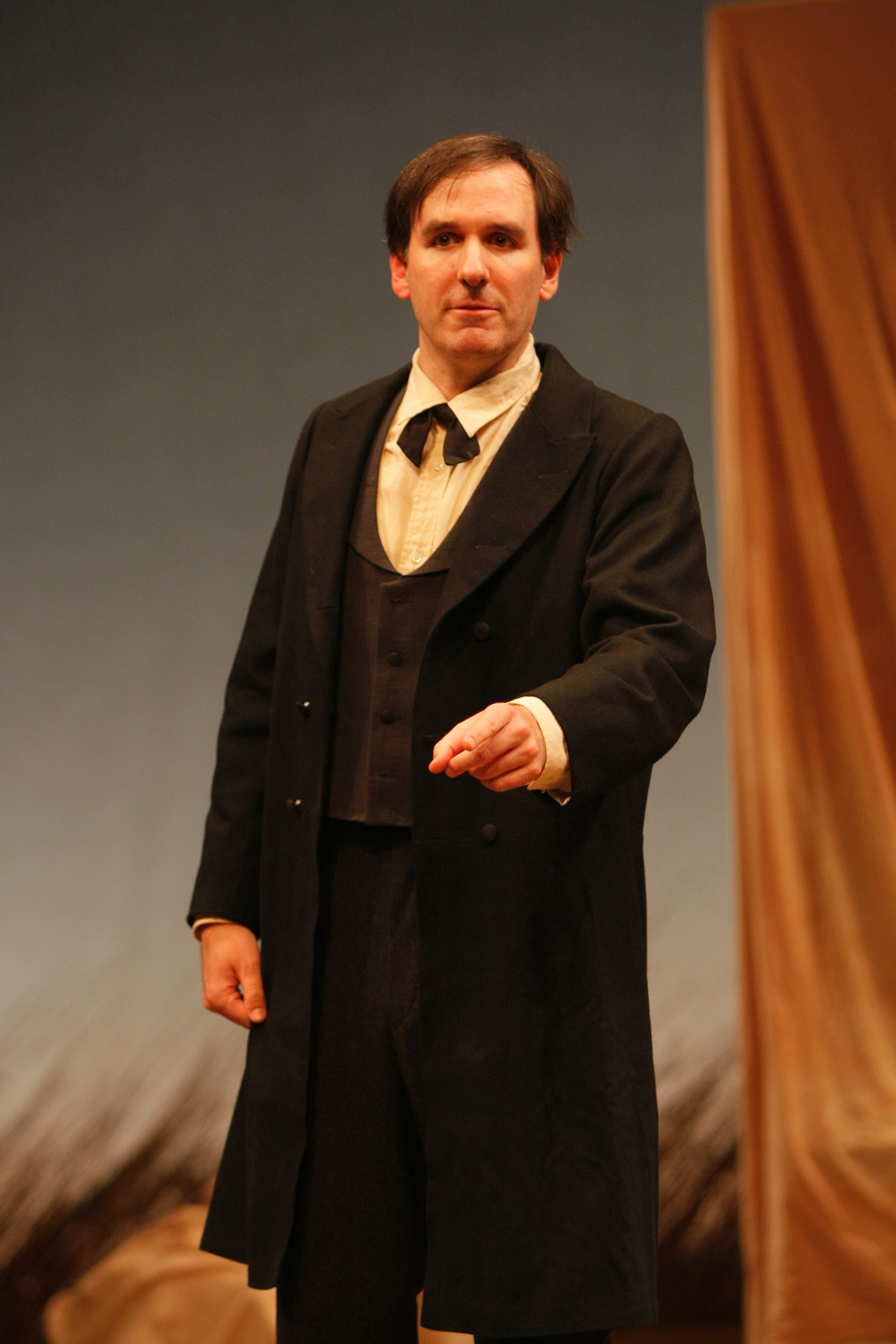Unless you’re a professional historian, your idea of Honest Abe is likely an assortment of vague notions, clichés, and misattributions. Intiman’s production of Robert Sherwood’s Abe Lincoln in Illinois dispels many of these (like the fallacy that Lincoln was unflaggingly considerate) while supplying some others without which dramatic narrative couldn’t happen. The three-hour investment pays off painlessly, yielding a surprisingly funny, tender portrait of a self-doubting yokel whose uncommon empathy overrides his own considerable resistance to the call of service. Because Sherwood and director Sheila Daniels let Abe’s flaws hang out to an unprecedented degree, I found myself falling in love with No. 16.
Impishly played by Erik Lochtefeld, Abe starts as a loose-lipped, musket-toting yahoo whose goofy good nature (plus his brawn) has a civilizing effect on Illinois hooligans. Riddled with debts nobly incurred, and haunted by deaths that occurred early in his life, Abe’s fatalism (“I can’t change my nature”) oppresses him, even as he accepts his first elected office in the state Senate. Enter barmaid Ann Rutledge (Angela DiMarco), the plain and true north star for the rest of Lincoln’s life (which extended well past hers). His love for her is succinctly depicted in one glorious case-pleading scene that would make any woman glad to be alive.
Her death feels as catastrophic for him as an expulsion from Eden, and causes him to relinquish all hope of homey comfort. It creates a character-hardening process, which the play follows in detail as the people surrounding him begin to implement their own agendas. Friends and professional associates try to stoke his wan dislike of slavery into political resolve to do something about it, but Abe’s inertia is stronger than his convictions. The journey to finally committing to the fight is incremental, specific, and fascinating.
Sherwood invented the scene for Abe’s ultimate turnaround, which involves the privately spiritual Lincoln forcing himself to pray in a public setting simply because he realizes it’s what the people need. Like a doctor administering a placebo, he forsakes his own ego for a larger goal. From here his destiny is pretty much sealed, but the fine writing, acting, and directing, plus a closer examination of the political issues of the day (industrialization of the Northeast, expansion westward, the implications of the Dred Scott decision which institutionalized the pro-slavery position of the South nationwide, etc.) is riveting. For those less enamored of policy and legislation, Abe’s politically expedient but personally problematic marriage to Mary Todd provides a pretty juicy B-story. Sherwood earns his Pulitzer with well-constructed scenes that disguise exposition as conflict and seamlessly make insiders of the audience.
The production is enhanced by simple motifs. As a backdrop, a huge illuminated sky changes colors to suggest promise or foreboding behind dark silhouettes of wheat fields. The opening sets project a bit of myth-like whimsy, with chairs hovering high above the action like dream elements in a Chagall painting. The show’s score, composed and arranged by Gretta Harley, offers a couple of beautiful sung pieces, including the chilling “I Am Unprepared for Eternity” that accompanies Abe’s reaction to Ann’s death and an equally haunting harmony following his awkward “date” with Mary. A few songs are purely hokey, but even they enrich the atmosphere. The casting of Reginald André Jackson, who is African-American, as the brother-in-law of Mary Todd—the son of the white governor of Illinois—was momentarily confusing when he was targeted by rural hooligans for his political and social position without reference to his race, but his confident performance quickly rendered this a non-issue.
The show’s attention is split between a regular man rising above his fears and the community that gestates and births him. That community’s needs shape the gifts he offers, however reluctantly. But as he rises in the world, the staging imagery increasingly emphasizes his alienation and apotheosis. The dais at his candidates’ debate with Stephen Douglas becomes a catafalque for a marked man, buoyed by members of the adoring public and slowly receding into the horizon of history.








